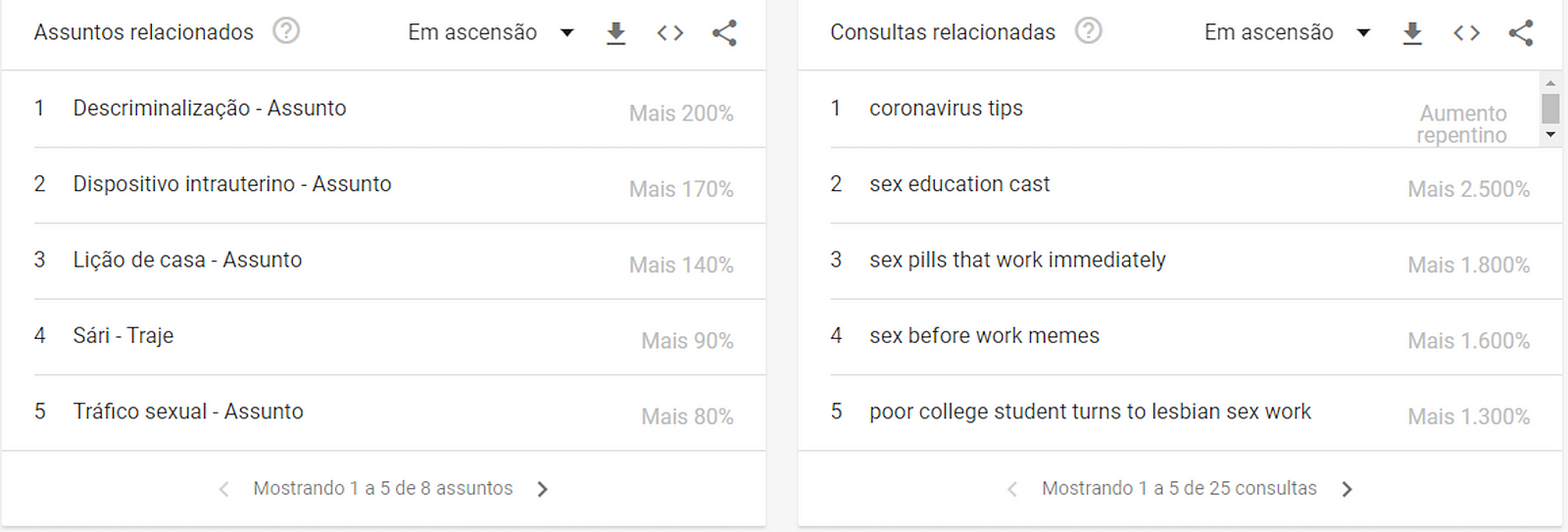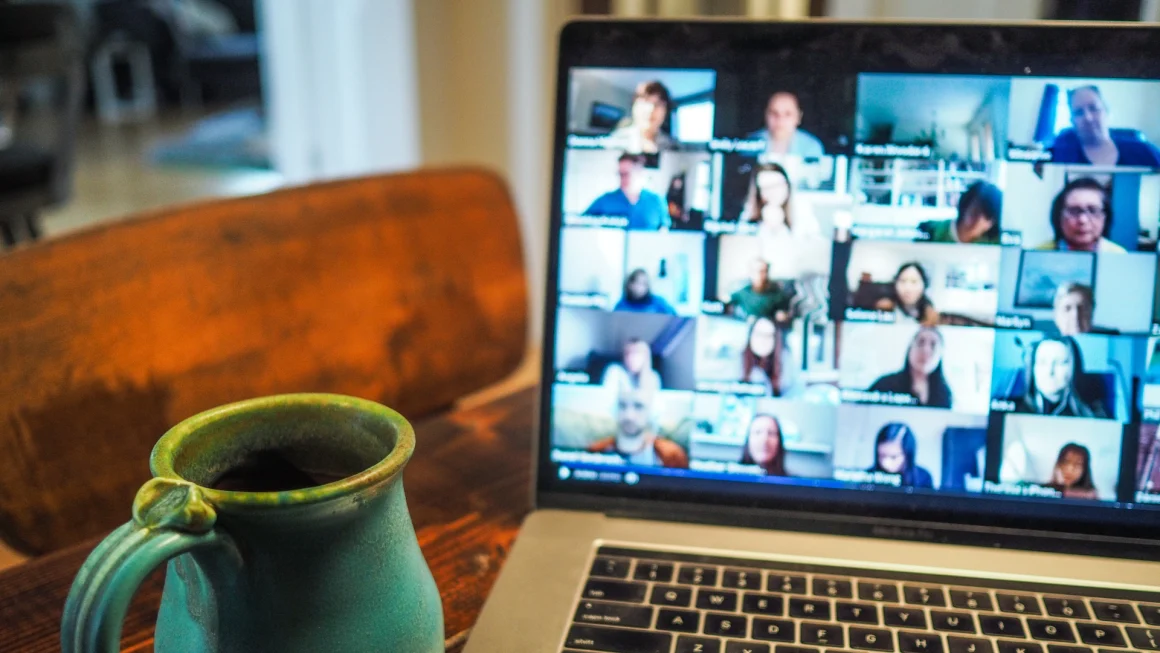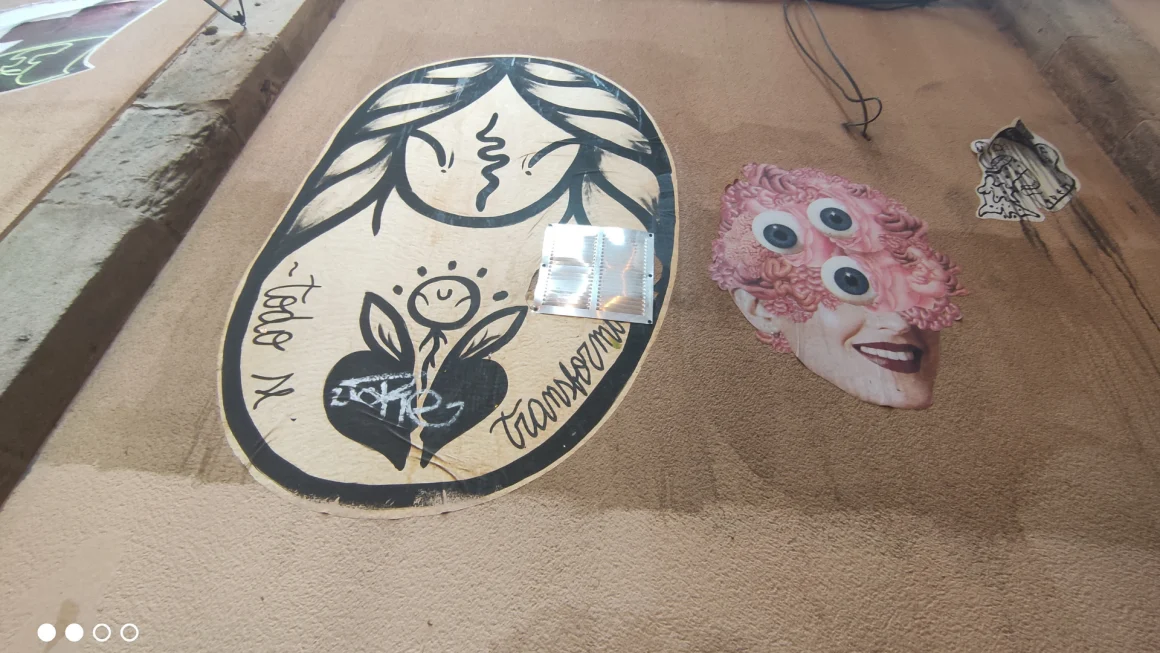Let’s talk about SEX. Its industry, its bodies, its esthetics and its economy.
This topic is far too old to be considered a cool sign in itself. But, if we consider it as a taboo that has recently been broken in a number of curious ways, it gets some freshness that deserves to be analyzed.
I have found an increasing number of discussions about sex, sexuality and sex work, which made me reflect a bit more about these issues. From political movements to even new terms such as SexEcology, a few topics started to pop up and seemed to show some possible connections: #socialmedia, #isolation, #pandemic, #economy, #feminism, #gender and so on.
The first questions that came up were about important factors that could have helped increase the discussions about sex and sexuality nowadays. Also, did the pandemic and its economic effects influence it in somehow? And how did social movements cope with that? To clarify the context a little, I did a quick search on Google Trends (worldwide, 2016–2020)to find out about other topics related to sex work specifically. The results confirmed that the discussion around the topic is maturing and is overcoming the taboos and misconceptions previously associated with it: “decriminalization” and “sex education” were the main related queries.

The first thing we should consider as a relevant factor is social media itself. The bases of its existence and interaction are visuality and aesthetics, which demands a totally different way of communication. For professionals or amateurs to be successful, they must create a specific balance between the amount of text, image, motion and sound in every touchpoint on social media.
If through social media we are getting accustomed and stimulated to see others (many of them strangers) and feel close to them on a full-time basis, we are also responding in the same way: showing ourselves more and more. We are not only exhibiting our faces and bodies more and more, but we are reinterpreting intimacy as something that should be preserved for specific moments. Acceptance is another relevant issue that has promoted debates in and outside social media. According to some critics, filters and apps for photo edition are conditioning us with images of bodies, skins, noses and asses that are not real. Even Instagram recently banned plastic surgery filters to protect the user’s mental health. Even some online campaigns battling that issue have been launched and have gained substantial support among online communities.
The realness and acceptance of bodies and beauty standards are also trending topics among feminists and gender movements. In general, feminists fight against the stereotyping and objectification of women, while promoting the principles of freedom and respect. To this, the gender movement adds free sexuality and identity. Both help to end (or at least soften) this taboo by defending empowerment, pleasure and the abolition of limiting standards.
Ok, we might have understood some factors that influence the self-exposition and freedom of bodies, beauty and sexuality. But more specifically with regard to making money off sex, we could point to a very interesting and recent example: Only Fans.
The app was launched in 2016, but it boomed in March 2020 (in the beginning of the pandemic) and now yields more than 93 million results on Google. This online platform basically works like any social media platform, but the difference is that you must pay to access the posts. Every content creator has a page and gets money from the subscriptions.

On Only Fans, you can find content about music, yoga, art, nature, classes and adult content. The main advantage is already dubious and curious: in one hand, you have a bigger privacy because people have to pay to watch you, and, on the other hand, you have the freedom to post nudes and porn content without being blocked as on Instagram, Facebook and other big social media platforms.
Ok, this is something new. This is an interesting mix between social media and intimacy, social interaction and pornography, privacy and professionalism, digital and real contact. But let’s go further! We must understand why this is trending now and what motivation people could have had to make this go viral.
Well, talking about “now” in 2020 means talking about #pandemic too. In this sense, what kind of necessities were developed or reinforced in this context of lockdown?
There was a lack of: social and affective interaction, events, parties, dancing, dressing up, make up, going out, flirt, eye contact, touch, smell, dating, feeling attractive, being sexy and… SEX, of course! I could keep giving examples of things we miss, but I think I gave you enough reasons why people felt more stimulated to expose themselves in a more intimate way this year.
Another important point relating to Only Fans, sexuality and the pandemic is the new interpretation of our #home. You probably already read and thought about it a lot, but just to reinforce: our #house got multifunctional, hyper flexible and adapted to many personal and professional necessities. From furniture to decoration, colors and plants, our houses started to mean much more than before. Now it has become an office, a playground, a pub, a cinema, and why not a motel?
Taking pictures at home is something very normal, although being sexy and making porn in your real bed is another step. Do you remember about the displacement and reduction of intimacy I mentioned? This is a very good example of that, because we were used to associate sex in our bedroom or even a date at home as a step towards a relationship, right? Bringing someone home used to mean an invitation to enter into somebody’s life. Symbolically, it used to be a bigger deal than it is today.
Now, my friends, if we cannot exchange our bedrooms for hotel rooms to have sex, to be sexy, to release our fetishes and fantasies, let’s do it virtually!
In this sense, could Only Fans be understood as a tool or a medicine against isolation, stress and depression? Could the easier access to and stimulation by pornography be interpreted as a counter-movement to the recent worldwide panic and its negative consequences for mental health? Could the chances of making money with digital intimate exposure be considered a form of sex work? If yes, should we implement legal measures to ensure safety to those who choose to engage in it? Would it be wrong to continue to engage in or encourage it after this isolation period is finished? Or should we just assume that this is a natural evolution of the “traditional” social media we all knew?
I will leave you with these invitations for a deeper reflection, free of judgments and prejudice. I do not have all the answers right now and I believe that we need more temporal distance to look at it properly. However, I bet this is just the beginning of a bigger movement of reflection on the digital interaction we all knew before #COVID-19.
References
F Club blog “Sweet! Tasty! Sticky!”https://medium.com/@SotT_team/sweet-tasty-sticky-66aa55264214
Rustlers — Sex Work Podcasthttps://www.instagram.com/hustlers__podcast/
Prostitution and Coronavirus https://www.them.us/story/sex-workers-speak-out-about-coronavirus
Sex Work Protests https://www.internationalwhoresday.com/
Vogue Portugal “EcoSex” https://www.vogue.pt/ecossexualidade
Google Trends, “Sex Work” https://trends.google.pt/trends/explore?date=2016-11-01%202020-12-13&q=sex%20work
Acceptance and Instagram filters https://elle.com.br/beleza/filtros-instagram-nos-deixam-iguais & https://www.bbc.com/news/business-50152053
Acceptance and real bodies https://www.instagram.com/p/CITwQDUDdG-/
Letticia Munniz — Self Love, real bodies https://www.instagram.com/p/CIRNyhjgM_Y/
Feminist, gender and artistic movements https://www.instagram.com/p/CFxNvepBYf0/
Girls working on sexy shop is ok https://www.instagram.com/p/CGVtt2pHZhK/
Only fans Website https://onlyfans.com/
Google Trends “Only Fans” https://trends.google.pt/trends/explore?date=today%205-y&q=only%20fans
Box1824 “Lockdown and behavioral changes” https://www.instagram.com/p/B_naN8Zn95O/






